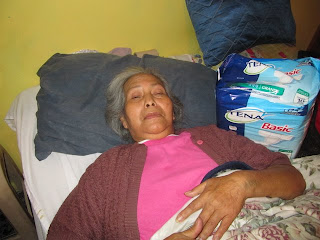(A-42) Status:
Sponsored as of Dec 6, 2012!
Needs: food, 1 full mattress, sweaters, blankets
(recieved mattress, food, blankets, table and chairs 12.6.2012)
A link to a previous story written about Filomena and Felipe can be found
here.
For more stories and photos of the
ancianos in the Feeding
Program, please consider purchasing a book compiled of our participants.
All profits go to the Elderly. You can preview the book
here.
When there was no such thing as running water, nor a community sink for the people to do their washing, Filomena took her son to the waterfall.
They walked a rocky trail along the mountainside, she carrying clothing or dishes in a basket on her head and her boy with a few things tied on his back, to where the water fell in three tiers into a pool at the edge of the road.
Some days they bathed there. Filomena would dip the head of her child in the pool, away from the surge, like any cautious mother-- who would not allow a hair to get wet unless she herself could place it back to where it lay on her baby's head, or if she could, would place the child back into her womb at the slightest sign of danger.
Once caught between this instinct and the task of rubbing the washing on the rock, she lost sight of her son, who was playing nearby.
He fell in and began to drown, pushed under by the force of the water.
She got him out, but he hasn't spoken since, she says. The water took the boy's voice for itself; it knew the things he had to say were too good for our ears.
We kneel in the dirt outside their one-room adobe house while Filomena leans against a tin tent that is her kitchen, telling us the story. The mute son, out of six grown children, is the only one who stays with her. The rest are married and therefore live apart, caring for their own kids, not speaking to her-- not because their words are precious, but because they cannot abate her begging.
They don't help us at all, she says.
The owner of the piece of land where they live will not allow them to have an Onil stove. The pieces are too big and too heavy, and who will take care of that when Filomena dies?
So they cook in a piece of tin over an open fire.
There's no
pila either, for similar reasons. They walk down the mountain to get their water and do their washing where there is a community sink.
I'm always nervous, she says. Whenever I've gone to see a doctor, they tell me my headaches, my high blood pressure-- it's because of my nerves.
Her son makes a little money standing in a tank of water in a town nearby, washing onions for $3-$4 a week. It is not a guarantee that he works; since Filomena can no longer form tortillas with arthritic hands, she no longer works, and they often do not have food. She shares the lunch she receives from Mayan Families with her son.
The four walls of the house are lined with their possessions: two beds donated to them some time ago, one with a mattress, the other with a straw mat in place of this, and along the other wall a dresser where they keep their clothes.
The door lets in light to the room like a river in the middle of a desert, making the emptiness obvious, that what would fill or quench it does not reach the walls.

































